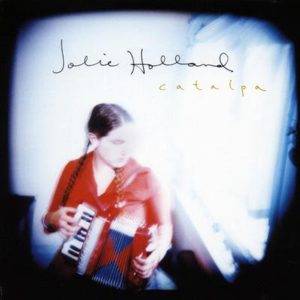 Jolie Holland makes new music that sounds — some of it, anyway — very old. A true daughter of the American South, she was born and raised in Texas, and cut her musical teeth on the gypsy-like circuit of like-minded musicians, artists, carnies and the like between Austin and New Orleans. The music on this bare-bones record combines elements of Appalachian balladry, bluegrass, Texas hill-country, and N’awlins jazz, sung in a voice that is at once young and carefree and older and wiser than the hills.
Jolie Holland makes new music that sounds — some of it, anyway — very old. A true daughter of the American South, she was born and raised in Texas, and cut her musical teeth on the gypsy-like circuit of like-minded musicians, artists, carnies and the like between Austin and New Orleans. The music on this bare-bones record combines elements of Appalachian balladry, bluegrass, Texas hill-country, and N’awlins jazz, sung in a voice that is at once young and carefree and older and wiser than the hills.
What to call this music? Post-modern old-time? I guess that’s as good a label as any, if you need labels.
Catalpa — named for a type of tree indigenous to the American South, with huge leaves and bean-like seed pods — was recorded as a set of demos, and this is its second printing as a CD, previously available only on her website and a few other online sources. It has a spontaneous, rough-hewn sound (the tape even captures her coughing at the end of one chorus) that perfectly complements the material.
Holland left the Vancouver, Canada-based folk trio the Be Good Tanyas shortly after the group’s debut disc was recorded, and is now based in San Francisco. She wrote or co-wrote nine of the twelve tracks on this album, including one, “The Littlest Birds,” which incorporates lines from a Syd Barrett song, and which appeared on the Tanyas’ album Blue Horse.
From the first track, it’s apparent that something different is going on. “Alley Flowers” features just Holland’s voice, backed by lightly strummed or plucked acoustic guitar and … a drum. It’s a huge Mexican frame drum, apparently with some clappers on it like a tambourine, tapping out a big, hollow tattoo. According to the liner notes, the drum is being played in 12/8 time, and the guitar and vocals are in 4/4, which gives the song a haunted, polyrhythmic feel. Coupled with her lilting, otherworldly vocal style and the lyrics, the song sounds like some sort of ancient Celtic blues: “Ain’t nobody’s got to shine, like you got to shine, in this world.” In the film Deliverance, when the menfolk were out on the front porch challenging the city-slickers to dueling banjos, the womenfolk were back in the dark, smokey kitchen, singing a song like this one. That’s what it sounds like.
And that’s just the first track. OK, they’re not all quite that arresting and original, but “Alley Flowers” can fairly represent the entire album, I’d say. It’s a bare-bones, acoustic based music with old-time trappings, informed by jazz sensibilities and phrasing.
“All the Morning Birds” is rife with more of those mesmerizing, poetic lyrics: “By 3 a.m. all the morning birds will be cryin’/and that old highway will be sighin’/and my dreams feel as cold as my bones/all the long walk home…”
A couple of the covers are straight blues: “Roll My Blues,” a 12-bar old-time country blues full of freight trains and such; and “Black Hand Blues,” an eight-bar with more trains and sorrow. The only track with electric guitar is another cover, “Wandering Angus,” in which Brian Miller put music to the words of W. B. Yeats. The romantic imagery of the poem is a nice fit with the dreamy quality of the music and production.
High points in this, an album with no real low points to speak of, are the aforementioned “The Littlest Birds,” a jaunty blues shuffle, and the hillbilly gospel of “I Wanna Die,” with the Tanyas’ Samantha Parton providing call-and-response backing vocals: “It’s through this world I ramble/and through this world I roam/I’m just a poor girl/and I ain’t got no home.”
I could go on and on, but if you’re at all intrigued by the description of Catalpa, you should experience it for yourself. This is one of the very few recordings that come out in any year of which it can be said, “This is a truly original work.” It’s a breath of fresh air in a look-alike, sound-alike world.
